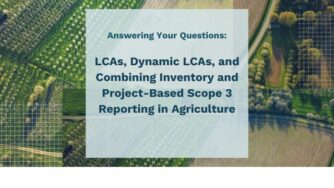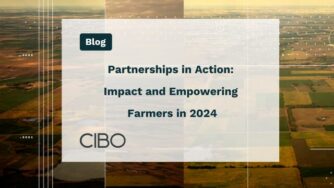Using scalable technology, CIBO helps end hunger, achieve food security, and improve nutrition with sustainable agriculture. CIBO’s mission is to accelerate regenerative agriculture. It is well established in the scientific literature and on-farm experience that regenerative agriculture creates healthier soils, climate-resilient crops, greater nutrient density, reduced chemical leaching and volatilization into air and waterways and better food system security.
CIBO combines incentives for growers to adopt regenerative and climate-resilient practices with scaled management, monitoring and verification of sustainable practice for enterprises with ag in their supply chain and value shed. By combining these two approaches, CIBO delivers the only scaled platform that accelerates the adoption of regenerative agriculture for both farmers and organizations.
The scientifically proven impact of regeneration on soil health, climate health, food system health and human health are unparalleled. The benefits to human health and nutrition are clear. According to Duke University, “Research increasingly shows a greater amount and wider variety of phytonutrients (natural chemicals that improve plant and animal health) are present in plants—as well as meat and milk produced from them—in regenerative agricultural systems,…initial data suggests humans can also benefit by the consumption of plants or meat and milk from animals that were fed phytonutrient-rich feed.” Additionally, studies show that the nutrient concentration of crops worldwide is decreasing due to climate change. Ecologically grown produce contains higher levels of antioxidants and phytochemicals and lower levels of chemical residue, all of which benefit human and animal health.
Furthermore, according to research published by the US National Library of Medicine and the National Institutes of Health, regenerative farming systems greatly reduce human exposure to pesticides and harmful chemicals while decreasing costs and increasing yields for growers, all of which create more resilient and healthy food systems. “Regenerative farming systems deliver greater ecosystem services and profitability for farmers than an input-intensive model of corn production. Pests were 10-fold more abundant in insecticide-treated corn fields than on insecticide-free regenerative farms, indicating that farmers who proactively design pest-resilient food systems outperform farmers that react to pests chemically.”
Finally, the benefits of soil health and the resulting food system security are clear moral, ethical and environmental imperative. “Regenerative agriculture rebuilds soil structure and thus vastly improves the ability of farmland to absorb and retain water. This makes crops less vulnerable to droughts and floods, both of which are predicted to grow in frequency under most global warming scenarios. The complex soil microbiome provides an array of ecosystem services which include natural suppression of pests and plant disease, reduced chemical leaching and volatilization, and improved water filtration and downstream water quality. … Given that the impoverishment of nutrients will most strongly impact vulnerable populations …growing healthier food is a moral and ethical imperative, in addition to an environmental and economic one. Regenerative agriculture can mitigate climate change through substantial levels of SCS (soil carbon sequestration), thus playing a role in slowing CO2 – induced nutrient loss in crops, and it can improve environmental quality by reducing dependence on and use of chemicals in the agricultural process.”
CIBO creates active and immediate opportunities for farmers and agricultural organizations to start, accelerate and grow regenerative practices. By fostering agroecosystems, soils, and microbial and plant communities that function at their full biological capacity, growers can produce crops of exceptional quality at lower overall costs while concurrently helping mitigate global climate change. With this scalable technology, enterprises are able to engage their growing networks, supply chain and value sheds to help create healthier soils, more nutritious products and a climate-resilient future.
Interested in learning more and finding out how CIBO can fit your company? Schedule a meeting with our team.
Get a Customized Enterprise Plan



